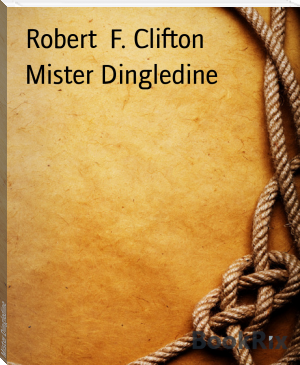Mister Dingledine by Robert F. Clifton (short novels in english .TXT) 📖

- Author: Robert F. Clifton
Book online «Mister Dingledine by Robert F. Clifton (short novels in english .TXT) 📖». Author Robert F. Clifton
“Of course. I understand.”
Three days later on a cold, winter, February morning Herbert stood at Ethel’s graveside. He watched as the undertaker's staff, acting as pallbearers placed the coffin then walk away. Father Holmes then began to speak. “I am the resurrection and the life, saith the Lord; he that believeth in me, though he be dead, yet shall he live; and whosoever liveth and believeth in me shall never die.”
As Father Holmes spoke Herbert stood deep in thought.
“ He was free. He was single again, able to come and go as he pleased. Ethel’s voice would not be heard again. Her complaints, her whining, her imaginary ills. It was all gone. Now, there is a chance for a new life. I can marry again, sire children, travel if I so desire. With Alberta, I can sell the house I live in and pocket the money, put it in the bank, have a nest egg for both of us. I can’t wait to see her and tell her of my plans.”
Herbert returned to work on a Monday morning. When he did he accepted the condolences from the members of the faculty. For some strange reason, Alberta did not offer words of comfort. Instead, she simply said, “How are you, Herbert?”
“Fine. I must speak with you, Alberta. I have so much to tell you,” he said.
“Herbert, lower your voice. People will hear us and make assumptions,” said Alberta.
“Let them. don’t you understand, I’m free.”
“We will talk later, but not here in school.”
“Then, where and when?”, he asked.
“I will let you know. In the meantime, we will keep our liaison private, as it has always been.”
“ I understand. I don’t like it, but I understand.”
“Good, now we will meet in the lunchroom as usual. I want you to act as though you are still saddened by the loss of your wife. Not as a suitor after my attention. Do you understand?”
“Yes, Alberta.”
On Saturday afternoon Herbert took the trolly and got off at the stop nearest to the street where Alberta lived. Single now, there was no need to sneak around or have meetings at the library or museums. He walked briskly to the house, climbed the three steps to the porch and knocked lightly on the front door.
A few minutes later Alberta opened the door and looked at him.
“Good afternoon Alberta,” he said
“Hello, Herbert. Please, come in. Give me your hat. We can sit and talk in the parlor,” she said.
“Excellent. I have so much I want to tell you,” he replied.
“Before you do, may I offer you a cup of tea?”
“No. No, thank you.”
“Very well. Now have a seat and tell me what’s on your mind,” she instructed.
“Before I do may I ask, where is your mother?”
“Visiting her sister. We are quite alone.”
“In that case, I shall begin. As you know the death of Ethel leaves me free now to marry. All you have to do love is announce our engagement and set a date for the wedding.”
“I shall do no such thing!”
“Why not?”
“Marrying so quick after your wife’s death would indicate that we had been having an affair while she was alive.”
“So what? Actually in a way we were.”
“But never intimate. Keep in mind that people would assume that we were.”
“Alberta, I don’t care. Marry me.”
Herbert, I suggest that you have a mourning period before we do anything.”
“ Fine and just how long would you suggest?”
“At least a year.”
“A year?”
“Certainly. That way our being together would appear to be natural. I would be seen as the young woman who offers and gives comfort to a man who had lost his wife. You, on the other hand, would be seen as a man looking to fill the void in his life by marrying again. Actually, you would be seen as a suitor.”
After Herbert left Alberta sat alone thinking. “Things have changed. I never expected that his wife would die. Now, he’s free, independent, able to make decisions, decisions that I might not necessarily like. The death has not only freed him of Ethel it has also made him potentially free from me. I don’t like it. I don’t like it at all. I could go along with seeing him, but there is no adventure in doing it. I enjoyed the surreptitious meetings, because of the danger of being seen together. That will not be the same now. There is no danger, no thrill. It’s all gone.”
Herbert walked into the saloon. As he did he enjoyed the feeling of being free, able to stop and have a cold beer without having to explain just why he had the smell of stale beer and cigar smoke on his person. The ten cents he paid for a beer in Ethel’s mind could have been used to pay for her medications, medications that never worked.
He took a sip of beer from the glass then placed it on top of the bar. Reaching into his rear pocket he removed a clean handkerchief then used it to blot the foam that had adhered to his mustache. He looked around, saw other men, mostly working men. Some sat at tables, others, like him stood at the bar. When no one was watching, he lifted one foot and placed it on the brass rail. After he did, he suddenly felt manly. It had been a long, long time since he had that feeling before. Now, he didn’t feel different or weak. Ethel’s death was as if someone had lifted a tremendous burden from his shoulders. He was free and he enjoyed being free. “Bartender? Another draft please,” he ordered.
Chapter Five
Investigation
It was on a warm, April morning that Herbert Dingledine decided that he could finally begin work on his next spring garden. The first thing he had to do was spread compost over the garden area and then till it into the ground. He walked to the shed, unlocked the padlock and opened the shed door. Then, putting on his gardening gloves took a pitchfork, placed it in the wheel barrel and pushed it out to the place where he wanted to work. Then he spent the next two hours spreading and tilling.
As the sun grew higher in the sky the temperature of the air increased causing him to perspire. He stopped. Leaning on the pitchfork and using his handkerchief wiped the sweat from his brow and the inside of his hat, paying attention to the leather hatband.
“Mister Dingledine?”
Herbert turned to the sound of an unfamiliar voice. He saw the head of a man standing on his property.
“Yes, can I help you?”, asked Herbert.
“I hope so. I’m Detective Sergeant Frank Bernhardt of the Philadelphia Police Department,” said the man showing his badge.
“What can I do for you?”
“I’d like to ask you a few questions.”
“About what?”
“The death of your wife, Ethel.”
“Fine, what would you like to know?”
Bernhardt looked around then said, “This isn’t a very good place for us to talk. May we go inside the house?”
“Certainly, come this way.”
The Detective followed Herbert through the back door, into the pantry, kitchen and finally, the living room. “Have a seat, anywhere,” said Herbert.
“Thank you. Now then, it has come to our attention that your wife, Ethel died in the hospital as a result of what appeared to be food poisoning at the time,” said Bernhardt.
“That’s correct. As a matter of fact that’s what I was told by the attending physician,” Herbert replied.
“I believe the doctor also told you that test would be conducted just to affirm his decision, correct?”
“Yes, as I recall he did.”
“And, have you received any reports regarding ant further tests?”
“No, not as yet.”
“Well, Doctor Pittman is convinced that the cause of your wife’s death was the ingestion of bad, green beans.”
“Yes, that’s correct. As a matter of fact, he asked me if I had green beans for supper.”
“Did you?”
“No, I don’t like them.”
“Yes, I know. It seems that you prefer yellow beans or so I’ve been told.”
“I do. I do indeed. I take it that you’ve spoken to Doctor Pittman.”
“Speaking of green beans, I noticed as we came through your pantry that the shelves a full of Mason jars containing vegetables.”
“Yes, gardening is one of my hobbies. Cooking and preserving is another.”
“Would you be so kind as to give me a jar of your green beans? I would like to perform tests on them,” said Bernhardt.
“For botulism?”
“Of course.”
“Certainly. I’ll go get it for you now.”
“And, perhaps a jar of the yellow beans.”
“ As I said, I ate the yellow beans. They seem fine.”
“ Like you, I enjoy yellow beans.’
“Then take a jar with my compliments”
On Monday, at ten o’clock in the morning, Sergeant Bernhardt sat in the office of Samuel Jennings, Principal of the high school where Herbert was employed. “Thank you for seeing me Mr. Jennings. Allow me to tell you exactly why I’m here. A member of your faculty, a Mr. Herbert Dingledine recently lost his wife. Her death was either accidental or perhaps something else happened to her. Unfortunately, my job is to ascertain the facts. I hope you understand.”
“I do indeed. However, when it comes to Herbert Dingledine may I say that he is an exceptionally, excellent teacher. He is always on time, presents his lesson plans to the head of the science curriculum and spends time with his students, in particular, those that might be failing.”
“How is he regarded by other members of the faculty?’, asked the Sergeant.
“As far as I know, very well. I know that he is very friendly with Miss Alberta Collins. She is an English teacher here.”
“Friendly, you say,” said Bernhardt as he wrote Alberta’s name in his notebook.
“Oh yes. They often have lunch together in the faculty lunch room. Other times Herbert has helped Alberta with her lesson plans.”
“Help her how. She teaches English. He teaches biology.”
“As I recall, they toured the various art museums searching for artwork related to Shakespeare. Alberta planned to include Shakespeare’s plays in her classroom. Such things as a painting of Ophelia or The Winter’s Tale would be a type of teaching aid, you see.”
“Yes, of course. Well, thank you very much, Mr. Jennings. You have been a great help,” said Bernhardt.
“You’re welcome, sir. I trust that Mr. Dingldine is in no trouble with the law,”
“ That’s not for me to determine sir. Thank you again.”
The following Saturday, Frank Bernhardt knocked on the front door of the home owned by Harriet Collins. “Alberta! Someone's at the door,” she said loudly.
“I’ll get it mother,” said Alberta as she made her way to the entrance She opened the door and saw a tall man with a heavy, brown mustache, dressed in a brown suit and wearing a tan derby. “Yes?” she asked.
“Miss Alberta Collins?”
“Yes?”
“Sorry to bother you, Miss. I’m Sergeant Frank Bernhardt of the Philadelphia Police Department. I’d like to ask you some questions if I may,” he said showing his badge.”
“About what, may I ask?”
“About a Mister Herbert Dingledine.”
Alberta stepped out onto the porch, closing the front door behind her. “Sergeant, I’d be glad to answer any questions you may have about Mister Dingledine, but I’m afraid your questions along with my answers might upset my mother. Could we do this another time?”
“Certainly Miss. Here is my card. Call me at headquarters and we can set up a meeting. We can meet at the location you choose or at headquarters. Your choice.”
“Thank you for being so understanding,” said Alberta.
“My pleasure.”’
At two PM the following Saturday Frank Bernhardt walked into a place called, Lilly’s Tea Room. When he did he quickly scanned the people seated at tables with his eyes. He saw Alberta Collins sitting at a corner table in the rear of the room. He slowly walked towards her as he removed the derby from his head. He stopped, looked at her and said, “Thank you for meeting with me.”
Alberta smiled. “Please sit down.”
Bernhardt took a seat and when a young waitress appeared next to their table said, “Just coffee for me, cream and sugar.”
“That’s odd, a robust man
 However, all readers - sooner or later - find for themselves a literary genre that is fundamentally different from all others.
However, all readers - sooner or later - find for themselves a literary genre that is fundamentally different from all others. 




Comments (0)